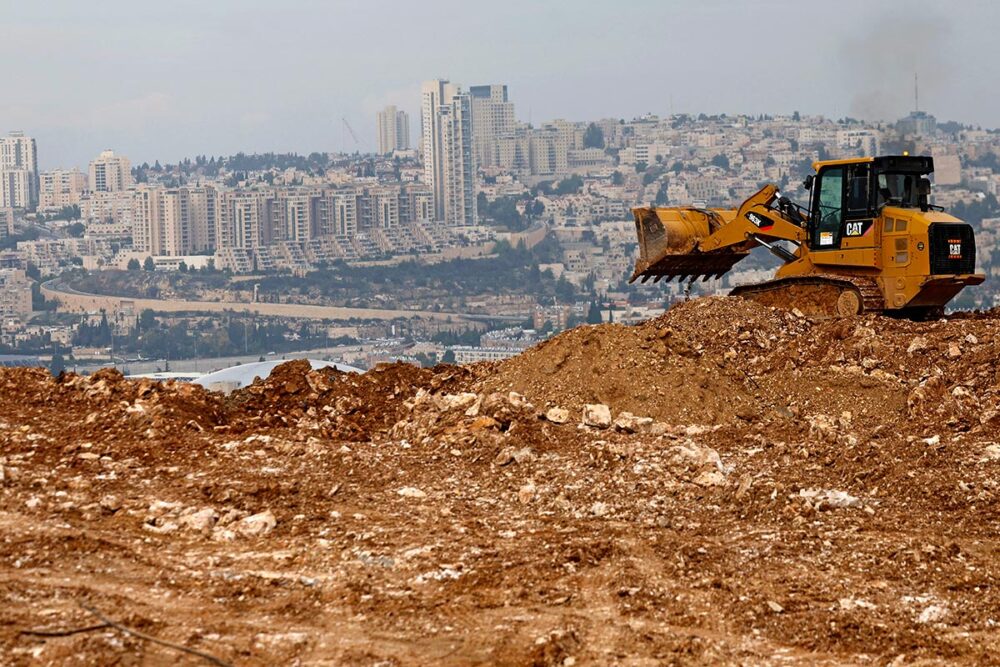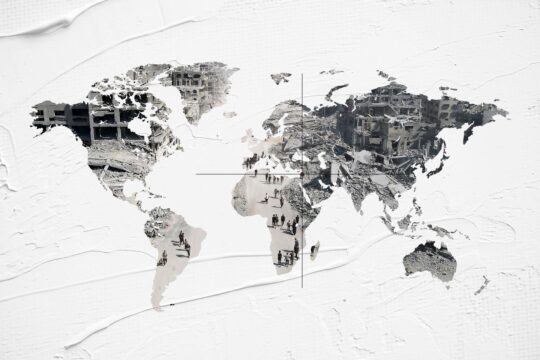“I’m not sure anybody expected something like this,” says Marko Milanovic, professor of public international law at Reading University, in the United Kingdom. “So many areas that were not expected, agrees Hassan ben Imran, of the NGO Law for Palestine and the Irish Centre for Human Rights at the University of Galway. “They were not even on the table. The advisory opinion is actually quite historic. I think it’s a great step in the right direction,” he adds.
But others disagree. “It’s extremely superficial. Riddled with very, very, significant omissions,” says Avraham Russel Shalev, lawyer at the conservative Israeli think tank, the Kohelet Policy Forum, in Jerusalem. In particular, “you have no discussion at all of Israel’s legal rights in the territory. They say ‘No information has been provided to the court to substantiate Israel’s deep historical and valid claims’. But that’s not factual.” he continues.
On Friday, 19 July 2024, the United Nations top court gave its advisory opinion on a question put by the UN General Assembly, after a resolution adopted on 30 December 2022, following a UN Commission of Inquiry. The question was whether Israel’s occupation of the Palestinian territories – the West Bank, Gaza and East Jerusalem – was legal or not. After having heard the parties, the International Court of Justice (ICJ) judges gave their opinion on two questions: what are the legal consequences of the occupation and what should states do about it.
WHAT DID THE ICJ SAY?
- Israel’s ongoing presence in the occupied Palestinian territories is illegal.
- Israel must end its presence in the occupied Palestinian territories.
- Israel should immediately cease settlement expansion and evacuate all settlers.
- Israel is required to make reparations.
- The international community and organizations have a duty not to recognize the Israeli presence in the territories as legal and to avoid supporting its maintenance.
- The United Nations should consider what actions are necessary to end the Israeli presence in the territories.
The 285-page decision is a multi-pronged examination of many aspects of Israel’s occupation, as a result of the six-day war in 1967, stemming from the principles that occupation should be temporary, and territory cannot be acquired by force. The judges held that an occupation cannot be used as an indefinite form of control and it “cannot transfer title of sovereignty to the occupying power.” Moreover, the occupying state bears a “duty to administer the territory for the benefit of the local population”.
“The big thing here”, says Milanovic is “the distinction between violations of the law during occupation and occupation as such, violating international law.” The judges are “basically telling Israel, it’s enough. You just have to leave. And that is a really big step”. But Shalev says that “for most Israelis, you know, the Israeli on the street who isn’t a legal expert, but also, policymakers, there’s a feeling of, what’s new here? Same old, same old”.
Israel’s practices amount to annexation
In fact, the court had previously said so in its 2004 advisory opinion known as “The Wall” – when it ruled that Israel’s settlement policies violate the Geneva Convention prohibition on transferring the occupying power’s own civilians into an occupied territory. But this time, the court went further about how the settlement policy amounts to annexation:
“The Court comes to the conclusion that Israel’s policies and practices, including the maintenance and expansion of settlements, the construction of associated infrastructure, and the wall, the exploitation of natural resources, the proclamation of Jerusalem as Israel’s capital, the comprehensive application of Israeli domestic law in East Jerusalem and its extensive application in the West Bank, entrench Israel’s control of the Occupied Palestinian Territory, notably of East Jerusalem and of Area C of the West Bank. These policies and practices are designed to remain in place indefinitely and to create irreversible effects on the ground. Consequently, the Court considers that these policies and practices amount to annexation of large parts of the occupied Palestinian territory.”
Systemic discrimination on land and water
Israel applies its own laws on Israeli settlers in areas of the West Bank and in East Jerusalem, which is part of the occupied territories: “In the Court’s view, differential treatment of Palestinians can give rise to discrimination”.
For the Court, “the public property confiscated or requisitioned for the development of Israeli settlements benefits the civilian population of settlers, to the detriment of the local Palestinian population”, which also violates international law.
In addition, “Israel’s policy of exploitation of natural resources in the occupied Palestinian territory is inconsistent with its obligation to respect the Palestinian people’s right to permanent sovereignty over natural resources”. Israel, said the court, has applied a discriminatory water policy.
The Court also addressed Israel’s discriminatory planning policies, the demolition of Palestinian homes and other legislation, concluding that “the regime of comprehensive restrictions imposed by Israel on Palestinians in the occupied Palestinian territory constitutes systemic discrimination based on, inter alia, race, religion or ethnic origin”.
The Court stops short of using the word ‘apartheid’
Israel’s actions violate the United Nations Convention on the Elimination of Racial Discrimination prohibition on “segregation and apartheid,” said the judges. But the ICJ stopped short of determining whether the situation constitutes ‘only’ segregation or, in fact, amounts to ‘apartheid’. That ambiguity on apartheid was likely deliberate, allowing as many judges as possible to join the majority.
“For something like this, they want to have as big a majority of judges as possible,” says Milanovic. “Although there may not be absolute clarity on apartheid, it’s a good starting point,” comments Zaki Sarraf of the International Centre of Justice for Palestinians.
All this analysis combined towards the decision that Israel, by its continued, indefinite, discriminatory and annexational control of the territories is violating the Palestinians’ right to self-determination and the prohibition on the acquisition of territory by force.
“The Court’s bottom line was thus very clear: Israel’s continued presence in the occupied Palestinian territory is illegal. It must bring an end to its presence there ‘as rapidly as possible,’ and it must ‘immediately’ cease all new settlement activity,” writes in Haaretz Aeyal Grossman, a professor of constitutional and international law at Tel Aviv University.
What about Israel’s security?
Shalev from the Kohelet Policy Forum says that the question the judges were considering was based on “a series of assumptions, that there is a Palestinian territory, that there is prolonged occupation, that there are discriminatory practices”. Obviously, if there’s no consideration whatsoever of Israel, both its historical claims and its security concerns, “it is rather jarring”, he adds.
Milanovic suggests that if the state of Israel had wanted to make the judges completely aware of the security situation, it “should have actually come to the court,” and present its evidence. “Nothing prevented Israel from going there and explaining to the court all that needed to be explained security-wise.” Nevertheless, he agrees that “the court should have explained a bit more why it thinks there’s no possible justification for Israel by way of self-defence. It’s a bit odd to just ignore, just pretend like there’s no Hamas and that Israel is not being attacked”.
“Considering that hundreds of thousands of Israeli soldiers have had to be called up, that there’s that there’s intense fighting going on for close to a year, that Hamas is still the one that controls the ground in most places in the Gaza Strip, the assumption that the Gaza Strip is still occupied by Israel is an absurdity,” says Shalev.
REACTIONS TO THE ICJ ADVISORY OPINION
Justice Info asked its interviewees to sum up their opinion in a few words:
“Very good” – Hassan ben Imran (Law for Palestine)
“Vindication” – Zaki Sarraf (International Centre of Justice for Palestinians)
“Ground-breaking” – Marko Milanovic (Reading University)
“Superficial” – Russell Avraham Shalev (the Kohelet Policy Forum).
From public sources, the reactions have been equally strong:
“A changing Advisory Opinion” – Juliette McIntyre (University of South Australia)
“A watershed moment” – Palestinian Ministry of Foreign Affairs
“Inevitable” – Eliav Lieblich (Tel Aviv University)
“Illusory and despicable” – Yuli Edelstein (Israeli Foreign Affairs and Security Committee)
“Fundamentally warped, one-sided, and wrong” – Israel Katz (Israeli Foreign Affairs Minister)
“Contrary to justice, the Bible, morality, and international law” – Israel Gantz (Binyamin Regional Council)
“Wow” – from Alonso Gurmendi (Kings College London).
Weapons’ exports to Israel challenged
For Palestinian justice campaigners, “this advisory opinion presents you with a number of legal tools that could be pursued to advance the Palestinian legal struggle,” says Ben Imran. “It’s great to see that clarity,” agrees Sarraf. “The advisory opinion from the ICJ makes it clear that at the highest level, Israel’s treatment of Palestinians cannot go on”.
The opinion implies that states must not recognise Israel’s conduct as lawful and must cease aid and assistance to Israel in furtherance of its illegal conduct. “So, I don’t see how that can be reconciled with continued arms exports to Israel when we know about the credible allegations of international crimes,” says Saraf.
At the ICJ, there are several ongoing cases concerning the continuing war in Gaza under the Genocide Convention. One is brought by Nicaragua against Germany, where Berlin is accused of breaching international law by supplying weapons and support to Israel.
Several domestic cases have also been brought concerning arms exports to Israel. In the Netherlands, a court has ruled that the government should not be supplying arms, but that case is awaiting consideration on appeal by the Dutch Ministry of Foreign Affairs. In the United Kingdom, lawyers have challenged London’s exports of arms to Israel in connection with the current Israeli campaign in Gaza. That UK case is due to be heard in October.
This advisory opinion “is going to have a real-life impact on the situation that’s happening now in Gaza,” says Sarraf. “If the UK wants to continue providing arms, I think we could really bring a strong case for complicity of the UK in terms of the facilitation of war crimes, crimes against humanity and a plausible genocide in Palestine.”
Meanwhile, a stone’s throw from the ICJ is the International Criminal Court (ICC) also based in The Hague, which has an ongoing investigation into alleged crimes in the Palestinian territories. Pre-trial judges are currently considering whether to approve arrest warrants against both senior Hamas and senior Israeli officials, including Israel’s Prime Minister and Defence Minister, on charges of war crimes and crimes against humanity in relation to the Gaza conflict.
The ICJ opinion, a legal basis for UN sanctions?
Grossman argues in Haaretz that after this ICJ opinion, “legally, Israel will no longer be able to argue that its occupation is ‘temporary’ until an agreement in the indeterminate future is reached”. For Shalev, the opinion is “all negative” which reflects “a set of Palestinian maximalist demands, but it’s so disconnected from the way Israelis look at a conflict now, if it weren’t so absurd, it would be amusing”.
In practical terms, says Ben Imran, it is now “the job of the United Nations General Assembly to translate the judges’ words into actual, practical, steps”. “One could be financial economic sanctions, another could be diplomatic sanctions,” he says.
Ben Imran looks back to the international campaign against apartheid in South Africa, when “everyone realised that the only way forward to pressure apartheid South Africa to come to its senses was to isolate them politically”. Therefore, “the question of unseating Israel from the UN can actually seriously come to table based on this advisory opinion”, he adds.
“A first, necessary step” forward for Palestinians
To those who say that this opinion will likely go nowhere, Grossman looks back to 1971, when the ICJ held that South Africa’s continued control of Namibia was illegal, and wrote: “The Court considers that the qualification of a situation as illegal does not by itself put an end to it. It can only be the first, necessary step in an endeavour to bring the illegal situation to an end.” “These words may well resonate today,” he says.
“Do not discount the power of authoritative statements in the formation of world order,” warns on X (ex-Twitter) academic Alonso Gurmendi of King’s College, London, who sees this case in the context “of much larger arc”, going back to decades, from when Palestine barely registered to now with the observer state status at the UN. He believes that the ruling strengthens Palestine’s and weakens Israel’s position.
“Palestinians have matured enough over the generations to know that justice will never come from a court. It’s not going to come from The Hague,” says Ben Imran, “but this advisory opinion is a huge step forward, that does revive a bit of trust or, let’s say, plant some seeds of hope for Palestinians to at least look further toward these institutions of law”.








